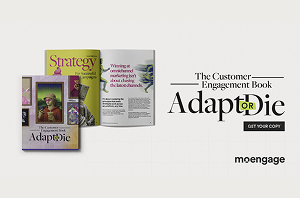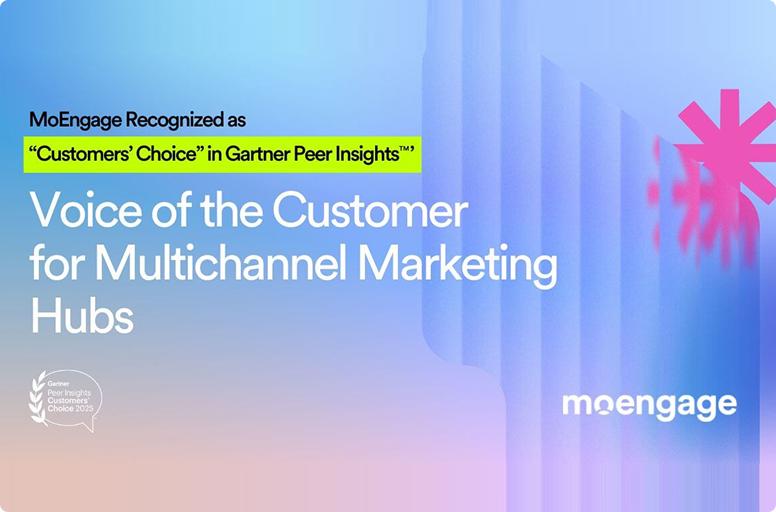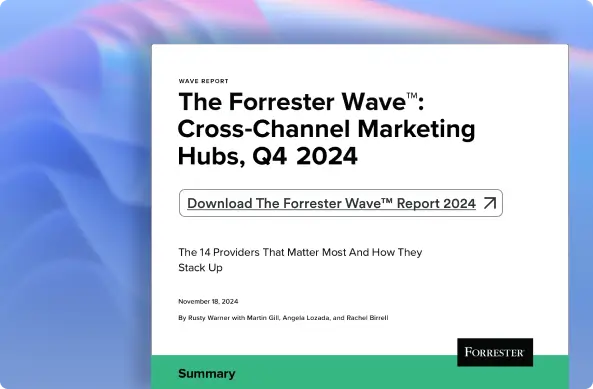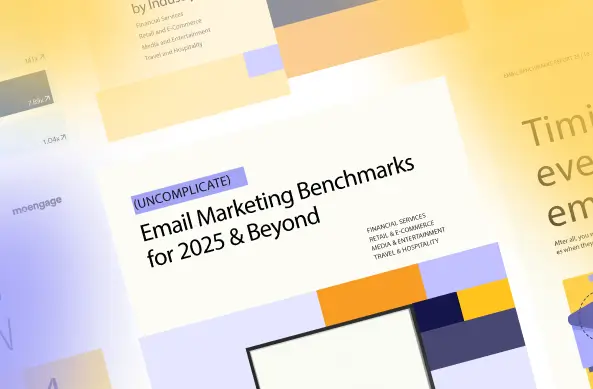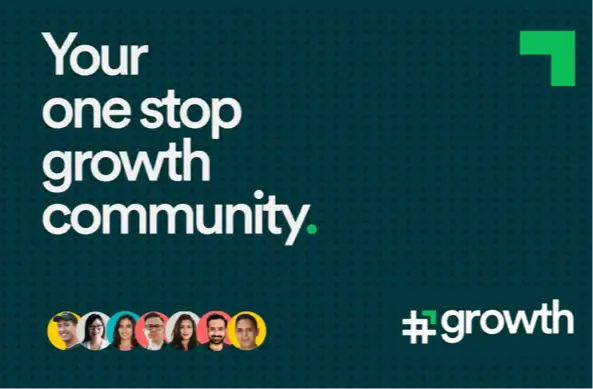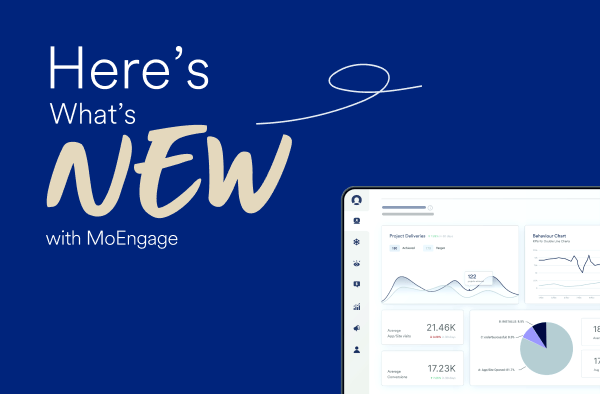How to Choose Enterprise Marketing Automation Software

Reading Time: 14 minutes
In recent years, brands have increasingly started adopting enterprise marketing automation to automate their marketing operations at scale. From generating and nurturing leads to onboarding and engaging customers, this marketing automation enables marketers to reach millions of customers and interact with them one-to-one.
According to a Statista report, the marketing automation software market is expected to grow beyond $11.2 billion by the 2030s.
However, with numerous enterprise marketing automation platforms offering similar benefits, selecting the right one can be quite challenging.
Marketers need to consider various factors, such as pricing, capabilities, support, data privacy and security, and scalability, when choosing the right platform.
Let’s find out how brands can make the right choice to automate their marketing operations and boost business growth.
What is Enterprise Marketing Automation?
Enterprise marketing automation is a strategic approach that involves automating and streamlining marketing operations for enterprise-level companies using advanced marketing automation software. It considers an enterprise’s complex needs, spanning multiple business units, regions, demographics, and product portfolios.
A B2C marketer’s day is buzzing with activities. From acquiring new customers to engaging and retaining them, the marketer has a lot to plan, execute, and measure regularly.
Now, imagine if they have to do it for hundreds and thousands of customers across different geographies, demographics, using a variety of your products.
Sounds complicated, right?
That’s where enterprise marketing automation comes to the rescue.
Unlike typical marketing automation, which primarily focuses on software, enterprise-level marketing automation is not just about executing campaigns at scale; it is also about empowering enterprise marketers to manage complex marketing operations efficiently.
The sole purpose of enterprise marketing automation is to enable enterprises to build and manage agile marketing operations that meet the dynamic needs of the market and customers, helping them stay ahead of the curve.
How Does Enterprise Marketing Automation Work?
Enterprise marketing automation allows enterprise-level organizations to efficiently manage campaigns across multiple channels while delivering personalized customer experiences at scale. Here’s how it typically works:
- Data collection: It begins with gathering data from different offline and online channels. Enterprise marketing automation uses software to integrate with various systems (like CRMs and platforms for email and analytics) and applications to unify customer data. It provides marketers with a 360-degree view of customer profiles, enabling them to analyze customer behavior and make informed, data-driven decisions.
- Triggers power the automated processes: After the data is connected, you can build workflows to trigger automated actions. Triggers are specific customer behaviors or lifecycle milestones that cause workflows to activate. For example, a webinar sign-up might automatically kick off a series of follow-up emails, or a repeat purchase could trigger tailored loyalty rewards.
- Personalization happens in real time and at scale: Next, marketers use the integrated data to segment customers based on demographics, engagement levels, preferences, and other data. This enables them to personalize and send targeted messages to the right segment at scale, thereby improving engagement. At an enterprise level, this can mean thousands of micro-decisions and responses happening simultaneously without human intervention.
- Optimization: Once workflows start running, the automation platform constantly tracks performance, monitoring who opened emails, clicked CTAs, or completed a journey’s intended action. By analyzing this real-time data, it identifies what’s working and what isn’t, feeding actionable insights back into the system for constant refinement.
Why Marketing Automation is So Important for Enterprise B2C Brands
Enterprise marketing automation is crucial for B2C brands, as it eliminates manual intervention from tasks such as planning and executing campaigns, generating leads, and managing the customer lifecycle — from onboarding to engagement and churn. It helps marketers engage customers across all channels, optimize campaigns, and maintain a steady inflow of leads into the lead funnel.
More importantly, it enables marketers to shift their focus from traditional operational tasks to more strategic and productive activities, such as generating revenue and driving business growth.
7 Ways to Get ROI By Automating Your Enterprise Marketing Efforts
An ROI of an enterprise marketing automation software is not limited to conversions alone. Here are some ways in which enterprise brands can achieve ROI using marketing automation:
1. Personalization at scale
Marketing automation enables enterprise brands to form deep connections with their customers. It allows you to personalize messages and experiences at scale by segmenting and sending targeted messages without manual intervention.
For example, a retail enterprise can send specific product recommendations based on browsing history or purchase behavior, making every customer feel like the email was written just for them. As a matter of fact, customers engage more with messages that feel relevant and valuable, building loyalty and boosting conversions.
2. Better customer engagement
The “right message at the right time” is everything today. Enterprise marketing automation ensures customers receive timely, relevant communications that guide them throughout their journey. Automated workflows enable brands to reach users when it matters most, without missing opportunities due to manual delays.
As an example, let’s say a customer downloads your app but stops short of creating a profile. Rather than disappearing into the digital ether, an automated onboarding sequence introduces the customer to key features, nudging them forward. Whether it’s a helpful push notification, an SMS, or an email, the brand stays engaged without overwhelming them.
The result? Improved retention, greater brand affinity, and customers who feel like they’re supported instead of sold to.
3. Increased productivity
Marketing automation doesn’t just lighten your team’s load. Instead of giving maximum effort in manually deploying campaigns or scheduling emails, marketers can automate repetitive workflows and focus on strategic initiatives that grow the business.
Imagine launching a multi-channel holiday campaign: automation can schedule your emails, trigger push notifications, and even manage your ad spend while your team zeroes in on creating high-performing assets and refining the customer experience. The enterprise marketing automation platform handles the operational lift, freeing up marketers to think bigger.
For enterprises managing high volumes of tasks, this level of productivity empowerment is the difference between surviving and thriving.
4. Increased ROI
Here’s the big one: enterprise marketing automation directly increases ROI by improving both relevance and timing.
Customers are far more likely to convert when they feel understood, and automation platforms are designed to do just that. Every interaction is tailored, whether it’s an email recommending complementary products based on a previous purchase or a limited-time offer sent when data shows a customer is most likely to act.
This leads to higher engagement, more conversions, and ultimately, greater returns on marketing spend. By making every touchpoint purposeful and impactful, automation transforms marketing from a budget line item into a revenue-driving engine.
5. Saves time
Time is money, and automation saves both. By automating repetitive tasks like sending personalized emails, responding to inquiries, or even posting across social media channels, enterprise marketing teams reclaim countless hours every week.
Take email marketing, for example. Without automation, sending tailored messages to thousands of customers would take… well, forever.
But with automation? It’s a matter of building a workflow once and letting it do the work every time that trigger is activated. The real beauty lies in what email marketing automation software can enable: marketers can invest the time saved into high-value projects like campaign strategy, creative development, and audience research, driving far greater results overall.
6. Implement a data-driven approach to marketing
Automation platforms provide custom analytics and detailed reports on what’s performing and what isn’t. From click-through rates to customer lifetime value, every aspect of your marketing efforts can be boiled down into actionable insights.
This data-driven approach eliminates guesswork entirely. Marketers can optimize campaigns in real-time, allocate budgets more effectively, and make informed decisions that amplify results.
For enterprises, this is a competitive advantage. With a marketing automation platform feeding insights directly into your team’s strategy, campaigns deliver more value with every iteration.
7. Align your sales and marketing teams
At the enterprise level, misalignment between marketing and sales is a killer. Marketing generates leads that sales don’t follow up on, or sales closes deals that marketing doesn’t count as conversion wins.
Enterprise marketing automation bridges this gap by creating a unified pipeline where both teams collaborate seamlessly.
Here’s how it works: while marketing builds, nurtures, and segments a high-quality lead pipeline, automation ensures only the most sales-ready leads make it through, complete with scoring metrics and detailed customer insights. This frees sales teams from sifting through irrelevant leads and allows them to focus on selling to the right customers at the right time.
5 Essential Components of Enterprise Marketing Automation
Every tool has some must-have features and capabilities. So, you need to ensure that no matter which platform you choose, it always has the following components for automating marketing operations.
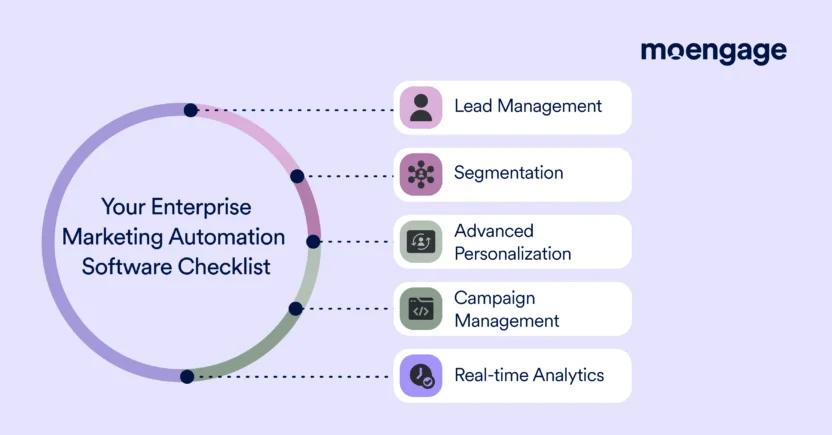
1. Lead Management
For enterprises with a long sales cycle, targeting all the leads can be time-consuming and resource-intensive.
Lead management eliminates the guesswork. It allows brands to capture leads, score them based on their propensity to purchase, and nurture them to convert them into customers. It improves resource allocation by helping teams prioritize the most promising prospects and engaging them with personalized communication.
2. Segmentation
The tool must go beyond just categorizing customers based on demographics. It must offer advanced segmentation capabilities, such as:
- Recency, Frequency, Monetary (RFM) segmentation to identify high-value customers who have purchased frequently or recently, and offer them personalized attention.
- Behavioral segmentation to target customers based on their browsing and purchasing behavior.
- Custom segmentation that combines multiple customer attributes to deliver a more personalized customer experience.
3. Advanced Personalization
The marketing automation tool must provide advanced web and mobile app personalization capabilities to:
- Deliver content based on attributes like location, browsing activity, and purchase history.
- Analyze customer behavior and recommend products that would meet their needs.
- Send contextually relevant messages to customers through various touchpoints, like emails, in-app messages, and push notifications.
4. Campaign Management
Ensure the tool offers campaign management capabilities, such as creating automated email campaigns or even cross-channel marketing campaigns for different channels, deploying and measuring their performance, and launching multiple cross-channel campaigns at scale.
5. Real-time Analytics
B2C marketing campaigns are dynamic. Hence, brands must adjust their marketing strategies in response to market and customer sentiments. The marketing automation tool must provide real-time analytics to enable marketers to make changes to the campaigns based on customer sentiments and target customers more accurately.
How to Choose the Right Marketing Automation Platform for Your Enterprise
Once you decide whether to invest in an enterprise marketing automation platform, start looking for the right one. It isn’t simple, but this list can help you get started.
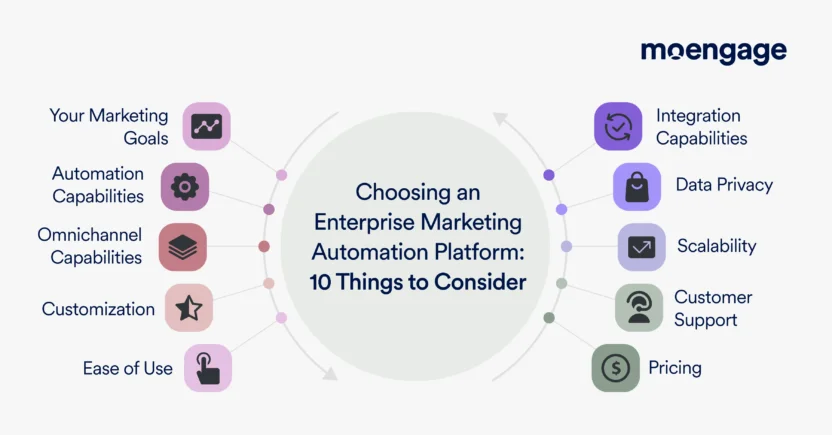
1. Your Marketing Goals
Automation tools require significant investment. Hence, ask yourself the following questions before choosing an enterprise marketing automation platform. This will help you make the right decision.
- Is your enterprise ready for automation? Enterprise marketing automation software is useful only when the enterprise has a considerable sales and marketing team and the budget to buy and maintain the platform. An investment in an enterprise marketing automation tool will also be fruitful if the enterprise has skilled resources who can manage the platform independently with minimal training.
- Why do you need an enterprise marketing automation platform? Answer this question to understand the real objective for choosing an automation platform. List down the activities that take up the most of the team’s time to gain more clarity and choose the right platform.
- How do you choose the right partner for deploying enterprise marketing automation? Do a thorough analysis of the partner to determine if they can understand your marketing goals and provide the right solution to you. Gather data about their performance and business cases solved by them, look for online reviews, and talk to peers before finalizing the partner.
- Is the platform future-proof? Regardless of the enterprise marketing automation platform you choose, ensure it is future-ready and adaptable to changing market scenarios.
2. Automation Capabilities
Since different marketing automation platforms offer different capabilities, check if they provide a comprehensive range of automation features. For example, ensure the platform offers components like segmentation, personalization, lead nurturing, and campaign management across all touchpoints.
3. Omnichannel Capabilities
Ensure the marketing automation platform offers omnichannel enterprise capabilities. It must enable you to send personalized messages to customers through various channels, including emails, in-app messages, SMS, and push notifications.
4. Customization
Every enterprise has its own marketing process and customer segments. Hence, ensure the enterprise marketing platform you choose supports customization. It should let you build workflows easily according to your customer lifecycle.
Additionally, it should allow you to customize templates, reports, and dashboards according to your needs and goals. Customization empowers your team to launch and manage more effective campaigns, and pivot and try new strategies to drive business growth.
5. Ease of Use
The objective of an enterprise marketing automation platform is to simplify marketing operations and make them scalable. Thus, eliminate all bottlenecks by choosing a platform that’s easy to adopt and use.
Platforms with a steep learning curve would find no takers. Hence, choose a platform that has a clean, intuitive user interface and easy functionalities, such as drag-and-drop, to deploy campaigns at scale without relying on IT teams. Ensure the platform provides the team with extensive training, including access to training materials and a comprehensive knowledge base.
6. Integration Capabilities
Smooth data flow between systems is crucial for automating marketing operations and personalizing experiences at scale. Thus, ensure the enterprise marketing automation platform you choose integrates seamlessly with your enterprise’s existing technology stack, such as the CRM and other enterprise applications. Opt for platforms that allow open APIs and pre-built integrations with other enterprise tools. This will enable you to create custom connections tailored to specific marketing needs.
7. Data Privacy
Considering their presence in various geographies and the volume of sensitive data they handle, enterprises must be mindful of data privacy. When evaluating platforms, enterprises must ensure that the platform complies with global and local data privacy laws, such as the General Data Protection Regulation (GDPR) and the California Consumer Privacy Act (CCPA).
It must store and process data securely, offer role-based access control, data encryption capabilities, and audit logs. Data privacy must be baked into the platform’s design.
8. Scalability
As the business and customer base grow, marketing activities will also become more complex. Marketers will deal with a large volume of data and users and launch various campaigns simultaneously. An unplanned downtime or slowdown could potentially derail the marketing plan.
A scalable marketing automation platform will help enterprises onboard new customers, engage them, and launch multiple campaigns across various markets for different customer journeys. Ensure the marketing automation platform you choose satisfies these requirements.
9. Customer Support
Choose a platform that prioritizes customer support. Customer support should be responsive, available 24/7, and accessible across all channels, including email, chat, social media platforms, and phone.
An additional feature to look for is the resources that the platform shares. Marketers should have access to a comprehensive knowledge base and must also offer training and access to community forums to learn from others and use the tool more effectively.
10. Pricing
Many enterprise marketing automation platforms display different pricing options during the sign-up process, but later surprise you by charging more through hidden fees. Thus, ask for a transparent breakdown of prices. Verify that additional charges for premium customer support, data storage, user seats, and advanced features are clearly outlined in the contract. This will help you plan your budget and maximize the value of your investment.
Top 3 Enterprise Marketing Automation Software Solutions
1. Best all-in-one platform to improve customer engagement: MoEngage
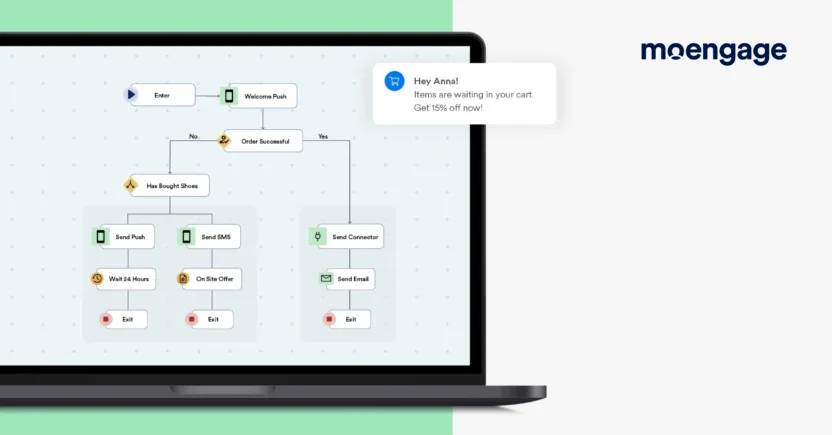
MoEngage is one of the best all-in-one solutions for enterprise marketing automation and customer engagement.
A full-stack, AI-powered marketing automation platform, MoEngage can help 4x the growth of enterprise brands through hyper-personalized and multi-channel experiences. From building complex workflows in minutes to orchestrating cross-channel marketing campaigns and personalizing messages based on real-time context, MoEngage manages everything. It supports over 50 billion messages monthly, reaches over 500M active customers, and processes over 1 trillion data points.
Best For:
- Ecommerce: Personalized promotions, cart recovery, and reactivation
- BFSI: Onboarding flows, transactional alerts, and retention campaigns
- Media & Entertainment: Content recommendations and churn reduction
- Travel & Hospitality: Lifecycle campaigns, loyalty rewards, and engagement
- Retail & CPG: In-store visit nudges, loyalty program promotion, and new product alerts
How Pricing Works: MoEngage primarily offers two pricing plans: Growth and Enterprise. While the Growth plan is designed for fast-growing companies, the Enterprise plan is tailored for large, global enterprises with complex marketing operations. The Enterprise plan includes features such as role-based access, team approval workflows, and advanced AI capabilities.
2. Best email marketing automation: SendGrid
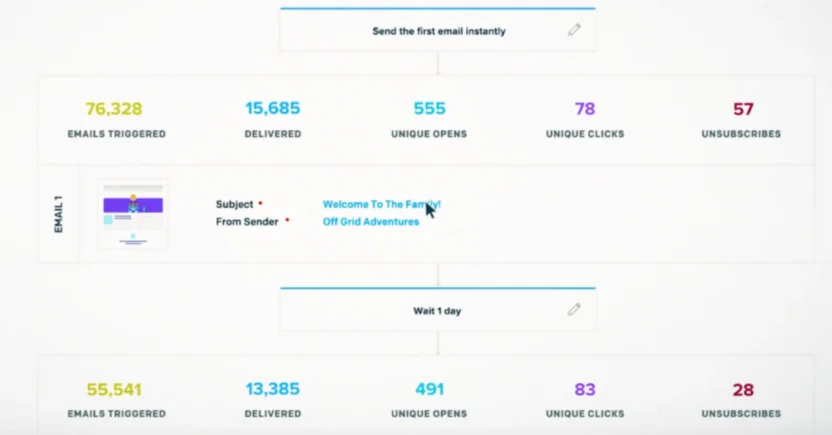
Twilio SendGrid is a cloud-based SMTP and email marketing service that helps marketers manage end-to-end email delivery: right from IP reputation to analytics. It enables marketers to send various types of emails at scale without worrying about maintaining their email servers.
With Twilio SendGrid, you can build drip campaigns, create responsive emails, monitor email performance, and test and optimize emails to improve deliverability and conversions. The best part is that you can integrate SendGrid with MoEngage’s platform to design and manage email campaigns within MoEngage without worrying about the email infrastructure.
Best For: Sending regular and transactional emails to a large customer base.
How Pricing Works: The pricing varies based on monthly volume and features. For example, you can use SendGrid for free to send up to 100 emails per day. However, if you want a full range of enterprise features and send to over 100K recipients, you need to opt for a Pro or Premier plan.
3. Best marketing automation software: Salesforce
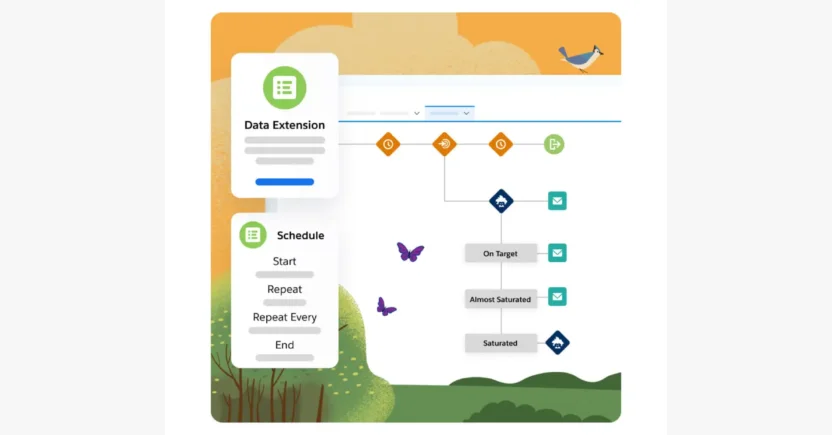
Salesforce Marketing Cloud allows cross-channel engagement across emails, SMS, mobile, and web, AI-powered personalization, and well-orchestrated customer journeys.
While Salesforce is also an all-in-one enterprise marketing automation platform, it has some limitations due to its clunky, legacy systems. However, enterprises using Salesforce can easily overcome this obstacle by integrating Salesforce with MoEngage.
Best For: Sending highly targeted email campaigns to customers using advanced segmentation capabilities. Marketers can also create individualized customer journeys across various touchpoints using the Journey Builder feature, score and nurture leads, and engage with and build long-term relationships using the tool.
How Pricing Works: Pricing varies based on features, organizational size, number of users, transaction volume, and other factors.
3 Case Studies on Enterprise Marketing Automation Showing Clear Impact
Now that we know how enterprise marketing automation works and how to choose the right solution, let’s examine a few real-world examples of how enterprise brands transformed their businesses.
Cocomelody observes a 27% boost in repurchase rate
Cocomelody is a US-based bridalwear brand that faced the challenge of increasing drop-offs across various channels. Additionally, they wanted to improve their Return on Ad Spend (ROAS). So here’s what they did:
- They used MoEngage’s CRM and analytics to integrate their online and offline channels’ data to create a unified customer profile and understand their intent, and detect when drop-offs take place.
- MoEngage’s segmentation capabilities helped them segment customers based on their behavior and lifetime value and send targeted Try-at-Home and Fabric Swatches campaigns to customers.
- They also leveraged MoEngage’s Dynamic Product Messaging (DPM), email, SMS, and web push notifications to re-engage their customers.
This perfectly orchestrated strategy, along with MoEngage’s solutions, helped Cocomelody achieve a 27% boost in repurchase rates and a 69% increase in ROAS.
S’more’s personalized customer engagement experiences uplift app engagement time by 65%
S’More is an anti-superficial dating app built on the mission of matching users based on their personalities rather than appearances. It wanted to improve its onboarding process to help users enhance their profiles and match with the right person.
This meant personalizing the communication on the app to engage the right type of customers. To achieve that goal, they used MoEngage in the following ways:
- MoEngage’s In-app Interstitials helped S’mores create awareness about the app’s new features.
- They also used MoEngage’s push notifications, emails, and SMS solutions to send personalized communication and engage customers.
This resulted in S’More enhancing app engagement time by 65%, increasing ‘Day 1’ customer retention by 20%, and achieving 15% higher onboarding completions.
Payactiv’s email notifications increase conversions up to 9x
Payactiv is a leading provider of earned wage access and financial wellness services. It wanted to migrate from its legacy system to a new one to send time-sensitive and personalized transactional and promotional messages to customers daily.
Payactiv migrated to MoEngage to combine both types of messages in a unified platform. Next thing you knew:
- They used MoEngage Inform to send time-sensitive alerts to customers across various platforms using a single API. Not only did it help Payactiv deliver personalized messages to 100K+ customers in just two seconds, but it also improved customer engagement and brand loyalty.
- They leveraged MoEngage’s Personalization capabilities to tailor messages based on the customer’s unique information, like name, transaction details, and amounts.
With the help of MoEngage’s marketing automation solutions, Payactiv increased conversions by 9x and enhanced cost-effectiveness and scalability.
How MoEngage Helps B2C Enterprise Brands with Marketing Automation
With enterprise marketing automation, B2C brands can orchestrate complex cross-channel campaigns, personalize experiences, and drive ROI.
However, success depends on the enterprise marketing automation platform chosen. The right platform doesn’t just simplify your workflows, it amplifies your entire strategy. It equips B2C enterprises like yours with everything they need to execute large-scale campaigns that truly move the needle.
If you’re looking for an all-in-one enterprise marketing automation platform, look no further.
MoEngage offers a comprehensive suite of marketing automation tools that will empower you to automate your enterprise marketing campaigns at scale and engage customers at every stage of their customer journey.
Planning to get started with marketing automation for your enterprise? Contact us to book a demo.

